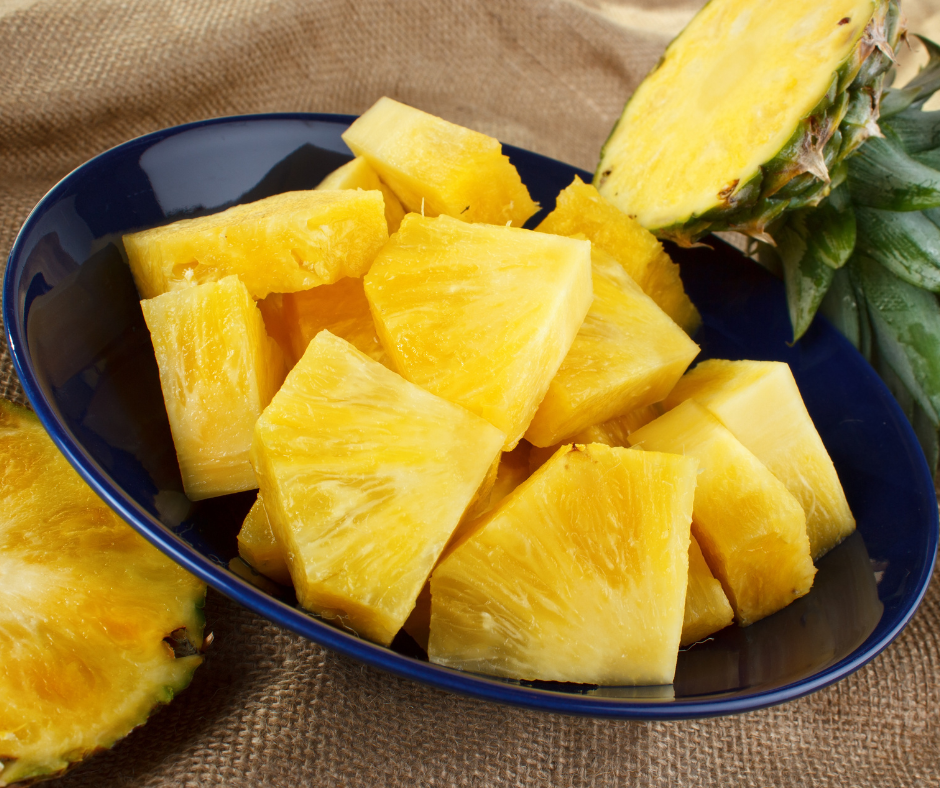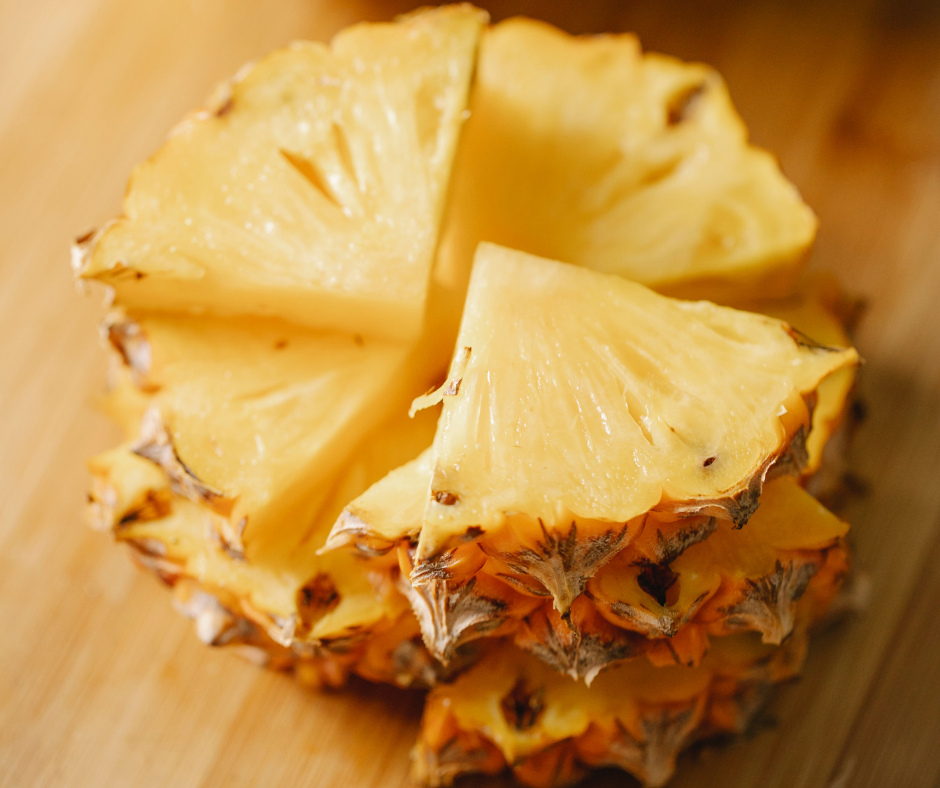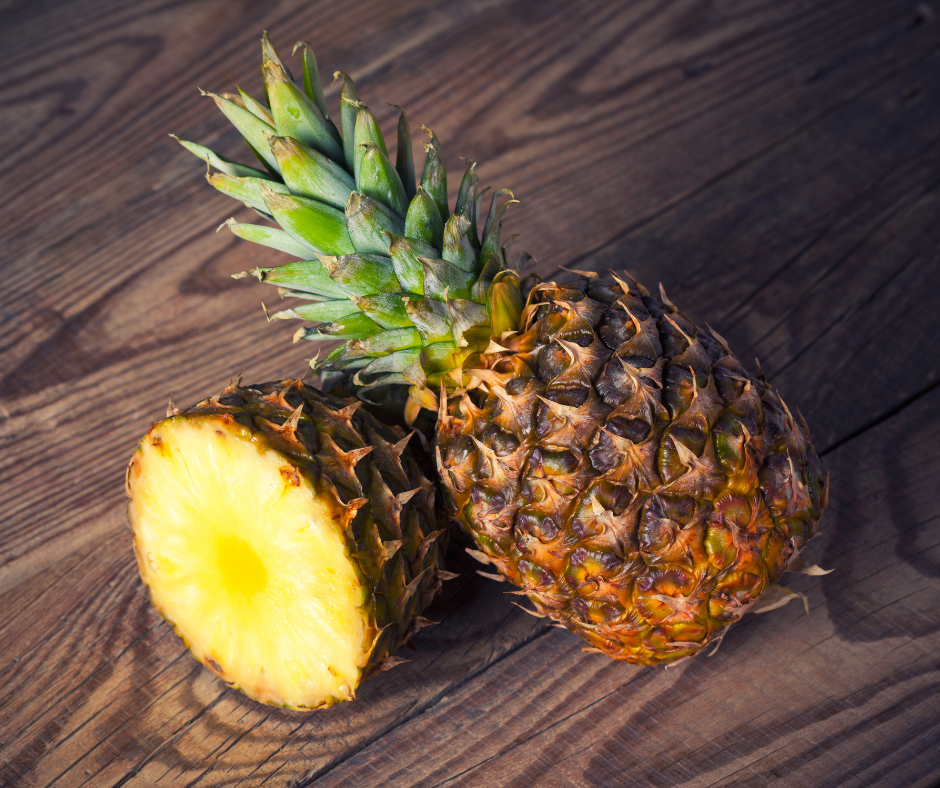Introduction
Many of us have heard the saying that pineapple “eats” you, causing discomfort or even pain in the mouth. But is there any truth to this myth? Does Pineapple Eat You Back? Let’s explore the science behind it and discover the role of bromelain in pineapples.
Myth: Does Pineapple Eat You Back?
The myth of ‘Does Pineapple Eat You Back?’ is based on the belief that the enzyme bromelain found in pineapple can break down proteins and cause irritation or soreness in the mouth. However, this is mostly a misconception. When we eat pineapple, the enzyme bromelain does come into contact with our tongue and other oral tissues, but it doesn’t actually “eat” them.
The mild irritation or tingling sensation that some people experience after eating pineapple results from bromelain breaking down proteins, including the enzymes in our mouth. This can cause a temporary sensation, but it’s not harmful or damaging to our oral tissues. The human body produces its enzymes to break down proteins as part of the digestive process.
Understanding The Role Of Bromelain
Bromelain is a mixture of enzymes found in the stem and fruit of pineapples. It has been studied for its potential health benefits, anti-inflammatory and digestive properties. Bromelain can help reduce inflammation, promote digestion, and even heal wounds.
In addition to its potential health benefits, bromelain is widely used as a meat tenderizer and a natural remedy for various conditions. It can be found in dietary supplements, skincare products, and a meat marinade.
While bromelain can break down proteins and has enzymatic activity, the amounts in pineapples are generally not high enough to cause significant digestive or oral discomfort in most people. However, some individuals may have a sensitivity or allergy to bromelain; consuming pineapple could lead to more pronounced reactions in these cases.
If you experience discomfort after eating pineapple, paying attention to the quantity consumed and how it’s prepared is a good idea. Bromelain is more concentrated in the core and stem of the pineapple, so removing these parts before consumption may reduce the chances of experiencing any potential discomfort.
In conclusion, the myth that pineapple “eats” you back is largely unfounded. The enzyme bromelain found in pineapples can break down proteins, but the amounts in the fruit are typically insufficient to cause harm or significant discomfort. For most people, enjoying the delicious taste of pineapple is perfectly safe and healthy.
The Health Benefits Of Pineapple
Many people enjoy the sweet and tangy taste of juicy pineapple, but did you know that this tropical fruit also offers a range of health benefits? From providing essential vitamins and minerals to enhancing fertility and aiding digestion, pineapple has become popular for those seeking natural remedies. In this article, we will explore the health benefits of pineapple and debunk the myth of ‘Does Pineapple Eat You Back?’.
Nutritional Value Of Pineapple: Vitamins And Minerals
Pineapple is packed with essential vitamins and minerals that contribute to overall health and well-being. It is a rich vitamin C source known for its immune-boosting properties and its role in collagen production. Pineapple also contains vitamin A, which supports eye health, and manganese, which plays a key role in metabolism and bone health. Furthermore, it provides smaller amounts of vitamins B6 and K, folate, and minerals like potassium and copper.
Antioxidant Properties Of Pineapple: Impact On Fertility
Pineapple contains antioxidants that can have a positive impact on fertility. Antioxidants help protect the body against oxidative stress and damage, which can affect sperm quality and reproductive health. Pineapple’s antioxidant properties and rich vitamin C content may contribute to improved fertility outcomes. While pineapple alone cannot guarantee fertility success, incorporating it into a balanced diet may support overall reproductive health.
Bromelain: The Key Enzyme And Its Potential Health Benefits
Bromelain is an enzyme found in pineapples that has been linked to various health benefits. It has anti-inflammatory properties, which may help reduce joint pain and swelling. Bromelain also aids digestion by breaking down proteins and promoting the absorption of nutrients. Additionally, it has been used as a natural remedy for respiratory conditions, such as sinusitis and bronchitis. However, it’s important to note that more research is needed to understand Bromelain’s potential health benefits fully.
In conclusion, pineapple offers a range of health benefits thanks to its nutritional value, antioxidant properties, and the presence of bromelain. Incorporating pineapple into your diet can be a delicious way to boost your overall health and well-being. However, it’s important to enjoy pineapple in moderation and consult a healthcare professional if you have any specific health concerns or dietary restrictions. So, next time you savor the sweet taste of pineapple, you can do so knowing that it tastes great and offers potential health benefits.
Myth Vs. Reality: Debunking Claims About Pineapple
Pineapple has long been surrounded by myths and claims about its potential effects on the human body. From rumors of pineapple changing vaginal smell or taste to its impact on digestion and injury healing, it’s important to separate fact from fiction regarding this tropical fruit. Let’s explore the truth behind these claims and understand the role of bromelain, a key compound found in pineapple.
Debunking The Myth: Pineapple And Vaginal Smell Or Taste
Contrary to popular belief, consuming pineapple does not directly impact vaginal smell or taste. The myth likely originated due to pineapple’s natural sweetness, which some people believe might make bodily fluids taste sweeter. However, scientific research does not support this claim. Vaginal smell and taste are influenced by various factors such as hormones, hygiene, and diet, but pineapple alone will not have a significant effect.
Pineapple’s Impact On Digestion And Gut Health
Pineapple contains bromelain, an enzyme that can aid digestion and promote gut health. Bromelain helps break down proteins and improve the absorption of nutrients, leading to smoother digestion. It may also reduce bloating and discomfort in some individuals. However, it’s important to note that while bromelain can benefit, consuming large quantities of pineapple alone may not solve digestive issues. Maintaining a balanced diet and considering specific dietary needs are key to supporting good gut health.
Pineapple And Injuries: The Role Of Bromelain In Swelling And Healing
Bromelain in pineapple has been recognized for its potential anti-inflammatory properties and its role in aiding injury recovery. Studies have shown that bromelain can help reduce swelling, bruising, and inflammation, making it beneficial for sports injuries or surgery recovery. It may also contribute to faster wound healing by promoting the growth of new tissues. However, it’s important to consult a healthcare professional before relying solely on bromelain for injury treatment or to address any underlying health condition.
By understanding the reality behind these claims, we can appreciate pineapple for what it truly offers – a delicious and nutritious addition to a well-balanced diet. While eating various fruits and vegetables, including pineapple, is essential, it can certainly contribute to a healthy lifestyle. So, next time you enjoy a slice of pineapple, savor the taste and the knowledge that you’re adding a tropical twist to your well-being.
Please note that individual experiences may vary, and if you have any specific concerns or conditions, it’s always advisable to consult a healthcare professional.
Incorporating Pineapple Into Your Diet
For pineapple lovers, this tropical fruit might conjure up images of beach vacations and refreshing summer treats. However, a myth surrounds this delicious fruit – the idea that eating too much pineapple can actually “eat” you back. Let’s explore the truth behind this myth and dive into the health benefits of pineapple, specifically its enzyme called bromelain, to answer ‘Does Pineapple Eat You Back?’.
Recommended Serving And Dietary Guidelines
To enjoy the health benefits of pineapple without worrying about any negative effects, it’s important to consume it in moderation. The American Heart Association recommends consuming 1.5 to 2 cups of fruit daily for adults, and pineapple can certainly be a part of that.
When including pineapple as part of your daily diet, it’s essential to consider portion sizes. One serving of pineapple is approximately ½ cup of fresh or canned pineapple chunks. It’s important to note that canned pineapple may contain added sugars, so opt for fresh or frozen pineapple whenever possible.
Fresh Pineapple Vs. Supplement Form: Which Is Better?
Fresh pineapple contains the highest levels of bromelain, the enzyme that gives it unique properties. Bromelain has been studied for its potential anti-inflammatory and digestive benefits. While supplements can provide concentrated doses of bromelain, they may not offer the same nutritional benefits as fresh pineapple.
The best way to reap the benefits of bromelain is by incorporating fresh pineapple into your diet. You will enjoy the natural sweetness and juiciness and benefit from pineapple’s other essential nutrients, including vitamin C, manganese, and fiber.
Delicious Ways To Enjoy Pineapple In Your Meals And Snacks
Now that you’re ready to include pineapple in your diet, here are some creative and tasty ways to enjoy this tropical fruit:
- Fresh and simple: Enjoy sliced pineapple as a refreshing snack or with other fruits for a colorful fruit salad.
- Grilled pineapple: Cut pineapple into rings or spears and grill them for a few minutes on each side. This brings out the natural sweetness and adds a smoky flavor to summer barbecues.
- Tropical smoothie: Blend fresh pineapple with coconut milk, a handful of spinach, and a splash of orange juice for a tropical and nutrient-rich smoothie.
- Pineapple salsa: Combine diced pineapple, diced bell peppers, red onion, cilantro, lime juice, and a touch of jalapeno for a sweet and tangy salsa that pairs well with grilled meats or as a dip with tortilla chips.
Incorporating pineapple into your diet doesn’t have to be complicated. Experiment with different recipes and cooking techniques to find your favorite way to enjoy this delicious and nutritious fruit.
Whether you’re enjoying fresh pineapple as a snack or adding it to your meals, remember to savor the flavor and embrace its numerous health benefits. And rest assured, pineapple won’t “eat” you back – it’s just another myth debunked!
FAQ: Does Pineapple Eat You Back? – Exploring Bromelain Myth
Q: Is it true that pineapple can “eat” you back?
A: No, the notion that pineapple can “eat” you back is a myth. Pineapple does not have the ability to harm or consume human flesh.
Q: What is bromelain, and why is it associated with pineapple?
A: Bromelain is an enzyme found in fresh pineapple stems and juice. It is known for its potential health benefits and plays a role in various physiological processes. It has been studied for its anti-inflammatory, immune-enhancing, and digestive properties.
Q: What are the potential health benefits of bromelain?
A: Bromelain has been researched for its potential role in reducing healing time and promoting a more effective immune response to infections. Some studies have also suggested its antiproliferative activity against ovarian and colon cancer cells. However, further research is needed to understand and confirm these benefits fully.
Q: Can eating pineapple improve immune function?
A: Some limited studies have suggested an association between pineapple intake and a more effective immune response to infections. Children who consumed canned pineapple daily had fewer viral and bacterial infections and experienced shorter recovery times. However, more research is needed to establish a definitive link between pineapple consumption and immune function.
Q: Does eating pineapple change the way your vagina smells or tastes?
A: No, eating pineapple does not alter the smell or taste of your vagina. The belief that pineapple can change vaginal odor or taste is a myth. Various factors influence vaginal smell and taste, but pineapple consumption does not have an impact on them.
Q: Are there any side effects or precautions to consider when consuming pineapple?
A: Although pineapple is generally safe for most people, some individuals may experience allergic reactions or digestive discomfort due to bromelain. If you have a pineapple allergy or sensitivity, it is advisable to avoid consuming it. Additionally, excessive consumption of pineapple may lead to mouth sores or digestive issues in some individuals.
Q: Can pineapple be beneficial for weight loss or digestive health?
A: Pineapple can be a part of a healthy diet due to its high fiber content, which may aid in digestion and promote weight loss by promoting satiety. However, it is important to consume pineapple in moderation as part of a balanced diet and lifestyle.
Q: How can I incorporate pineapple into my diet?
A: Pineapple can be enjoyed in various ways, including fresh slices, as a topping for salads or grilled dishes, blended into smoothies or juices, or as an ingredient in both savory and sweet recipes. Be creative and experiment with different recipes to include pineapple in your diet.
Conclusion
Now you know the answer to ‘Does Pineapple Eat You Back?’. As a pineapple lover, you might have heard the rumor that this tropical fruit “eats” you back. The myth of pineapple “eating” you back is just that – a myth. While pineapple contains bromelain, an enzyme mixture with potential health benefits, it does not directly harm your flesh or cause adverse effects when consumed in moderation. So, feel free to enjoy this tropical fruit as part of a balanced diet without any worries!
Separating Facts From Fiction: The Truth About Pineapple And Bromelain
The myth that pineapple “eats” you stems from the enzyme bromelain found in this delicious fruit. While bromelain does have some unique properties, it does not literally “eat” you.
Bromelain is a complex mixture of enzymes that can break down proteins. It is primarily found in the pineapple stem, although small amounts are present in the fruit. This enzyme mixture has been used for centuries in traditional medicine for its potential anti-inflammatory, digestive, and immune-boosting properties.
However, the amount of bromelain in a typical serving of pineapple is minimal and generally insufficient to cause any adverse effects when consumed. Bromelain is considered safe for most people when consumed in moderation as part of a balanced diet.
While pineapple contains bromelain, it does not directly “eat” away at your flesh or cause harm. The myth likely originated from the tangy taste and slight tingling sensation that some people experience when eating pineapple. This sensation results from bromelain breaking down proteins in your taste buds, similar to when you eat pineapple-flavored gelatin.
So, rest assured, you can continue to enjoy your favorite tropical fruit without fear of being “eaten” back.

Deb Carlson at Crosslake Coffee: Join Deb at Crosslake Coffee for a delightful blend of community, caffeine, and creativity. Discover the cozy ambiance and warm hospitality that make this local coffee shop a beloved gathering spot. From expertly crafted espresso drinks to mouthwatering pastries, Deb invites you to savor every sip and bite. Stay connected with the latest updates on specials, events, and live music performances by following Deb Carlson at Crosslake Coffee on social media. Embrace the vibrant online community and share your love for great coffee and good company with fellow enthusiasts. Don’t miss out on a moment of the Crosslake Coffee experience – connect with Deb on social media today.



